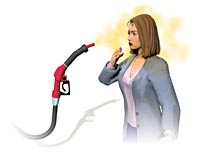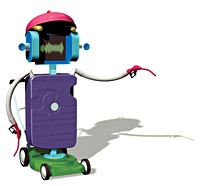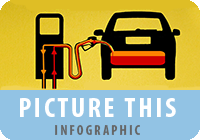Paying for gas you’re not getting? Spilling gas on your shoes or a new paint job? Tired of the smell of gasoline on your hands?
Don’t Top Off!
Stop fueling when the gas pump shuts off! ¡No llene demasiado el tanque de su auto!
 Save Your Money Once the nozzle clicks off the first time, the gas you’re paying for (at these prices!) is NOT going into your tank. It’s stuck in the hose, or getting ready to spill on the next person. In any case, you just increased your price per gallon by paying for something you’re not getting!
Save Your Money Once the nozzle clicks off the first time, the gas you’re paying for (at these prices!) is NOT going into your tank. It’s stuck in the hose, or getting ready to spill on the next person. In any case, you just increased your price per gallon by paying for something you’re not getting! Save Your Health Gasoline vapors are bad to breathe. When you smell gas, that means some highly toxic substances are in the air. Topping off your tank damages the vapor recovery system that’s designed to minimize the amount of vapors released into the air and protect our health.
Save Your Health Gasoline vapors are bad to breathe. When you smell gas, that means some highly toxic substances are in the air. Topping off your tank damages the vapor recovery system that’s designed to minimize the amount of vapors released into the air and protect our health.
 Save Your Planet Gas vapors also include volatile organic compounds that are involved in the formation of smog, which harms our lungs and our environment. Plus, when the vapor recovery system isn’t working properly and gas spills on the ground, the residue can run off into our creeks and our ocean.
Save Your Planet Gas vapors also include volatile organic compounds that are involved in the formation of smog, which harms our lungs and our environment. Plus, when the vapor recovery system isn’t working properly and gas spills on the ground, the residue can run off into our creeks and our ocean.
Gasoline Vapors and Your Health
Gasoline vapors include several substances considered toxic air contaminants by the state of California, including benzene, toluene, and a gasoline additive known as MTBE (methyl tertiary-butyl ether). Although MTBE is being phased out, it is still present in the fuel pumped at many stations. The state considers benzene a carcinogen, meaning that exposure over time can increase cancer risk; all three of these air toxics can produce acute or chronic non-cancer health effects.
As part of the actions to phase out MTBE in gasoline, benzene will be even further reduced than is required today. Benzene, considered one of the primary toxic air pollutants contributing to public health risks, can affect the central nervous system, the respiratory tract and immune system. Exposure to benzene has been associated with increased risk of different types of leukemias and other cancers.
MTBE can produce some non-cancer health effects, including nausea and dizziness, and the state considers that it may possibly be a weak carcinogen.
Toluene is considered a central nervous system depressant, and has been associated with cardiac arrthymias, and liver and kidney injury. It’s also considered by the state to be a developmental toxicant, meaning that it has the potential to affect fetal development.
Did you know that…Spilling a “shot glass” (one ounce) of gasoline produces the same volatile organic compound emissions as a car driving 56 miles?
How it Works
 In order to put gasoline into a tank — either an underground storage tank or a tank on a car — the tank has to be able to release the vapors that are already in it. Initially, gas stations and cars simply allowed the vapors to escape to the outside air. As we learned more about the toxic chemicals in these vapors, systems were developed to capture them before they could reach the air we breathe when we’re standing at the gas pump.
In order to put gasoline into a tank — either an underground storage tank or a tank on a car — the tank has to be able to release the vapors that are already in it. Initially, gas stations and cars simply allowed the vapors to escape to the outside air. As we learned more about the toxic chemicals in these vapors, systems were developed to capture them before they could reach the air we breathe when we’re standing at the gas pump.
The California Air Resources Board (CARB) led the effort to certify gasoline vapor control systems and require their use, starting in 1974. In 1990 the federal Clean Air Act amendments included requirements that vapor recovery systems at gas stations use CARB-certified equipment.
Since that time, vapor control systems have been enhanced and new requirements have applied on an ongoing basis. To find out the latest in this area, see www.arb.ca.gov/vapor/vapor.htm.
APCD and Gas Stations
Gasoline stations in Santa Barbara County are permitted and inspected by APCD. The vapor recovery systems are tested and inspected, and APCD Inspectors respond to complaints if a system is not working properly.
In responding to gas station complaints, APCD inspectors have seen the problems caused by people topping off. Vapor recovery systems have been impaired, and their effectiveness in reducing emissions of gasoline vapors has been significantly reduced.
Gas stations are considered an industrywide facility source of toxic air contaminants under the state’s air toxics “Hot Spots” program, which is implemented in Santa Barbara County by APCD. APCD has collected information on gasoline vapor emissions at county stations, applied guidelines used for assessing health risks from air toxics, and determined that benzene is the pollutant of greatest concern. APCD has developed a health risk screening table for gas stations, based on state guidelines, and uses this table to review permit applications for new and modified gas stations to ensure that the health risk is minimized.
For more information on air toxics in our county, see the toxics pages on this website.
Frequently Asked Questions
The pump shut off but I know I need more gas. Shouldn’t I keep trying to pump?
No. You could damage the vapor recovery system more, and and cause more problems. If you really think the pump shut off too soon, make sure to mention that to a station attendant, and try a different pump.
I picked up the nozzle and gas spilled out. What should I do?
It’s likely that someone before you topped off a tank and caused this problem for you, and the damage is done. The nozzle may still be able to function properly, but if you notice any more problems, tell an attendant at the station, and use a different pump.
Some nozzles have a rubber boot on the end and some have a thinner spout with holes in it. Why?
The boot and the spout are parts of different types of vapor recovery systems. They work differently, but both types of nozzles are certified to prevent gas vapors from escaping.
I started to fill my tank and there’s a strong smell of gasoline. What should I do?
Tell an attendant at the station, and to report a problem, call the APCD at 961-8800.
How can I reduce my risk of breathing gas vapors at the station?
Use the nozzle’s hold-open latch to pump the gas continuously, and stand upwind (but stay close enough to monitor it). Always remember to remove the nozzle before driving away — and be sure to tighten your gas cap.



